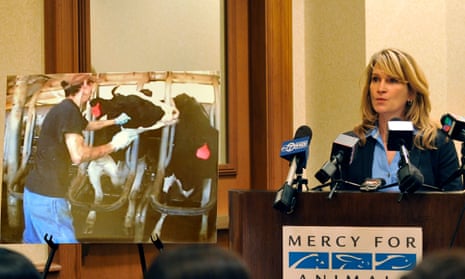A federal judge has lifted a controversial ban on undercover surveillance inside Idaho’s factory farms, delivering a significant victory to animal rights’ activists.
Judge B Lynn Winmill ruled on Monday that the state’s so-called “ag gag” law violated the constitutional right to free speech.
“An agricultural facility’s operations that affect food and worker safety are not exclusively a private matter,” said the judge. “Food and worker safety are matters of public concern.”
The agriculture industry’s political allies passed the law last year after an undercover investigator with the advocacy group Mercy for Animals used a hidden camera to expose cruelty and neglect at Bettencourt Dairies, Idaho’s largest dairy factory farm.
The 2012 exposé documented workers beating, kicking and shocking cows, twisting their tails and dragging them with chains attached to their necks.
It led to charges of criminal animal cruelty against multiple workers, including a manager, and prompted policy reform pledges by major food suppliers.
The state’s $2.5bn dairy industry said the sting was an attempt to hurt businesses and rallied legislators in the state capitol to pass a law making it a crime to film inside agricultural facilities. Governor CL “Butch” Otter signed it.
A coalition of animal activists, civil rights groups and media organisations lobbied the court to overturn the ban, saying it criminalised whistleblowers and chilled free speech.
Judge Winmill agreed. He said the law violated the first amendment and the equal protection clause because it was motivated in substantial part by animus towards animal welfare groups.
“The effect of the statute will be to suppress speech by undercover investigators and whistleblowers concerning topics of great public importance: the safety of the public food supply, the safety of agricultural workers, the treatment and health of farm animals, and the impact of business activities on the environment.”
Existing laws against trespass, fraud, theft and defamation sufficed to protect the dairy industry from wrongful intrusion, he said. “These types of laws serve the property and privacy interests … but without infringing on free speech rights.”
Matt Rice, director of investigations for Mercy for Animals, which is based in Los Angeles, welcomed the ruling. “This is a huge victory not only for the constitution but animals and consumers,” he said.
“The law was an attempt to sweep evidence of animal abuse, food safety problems, environmental violations and other crimes under the rug and keep them hidden from public view.”
He said the ruling will embolden challenges to similar laws in states such as Iowa, Utah and North Carolina.
Some politicians in Australia, which also has a powerful agricultural sector, have lobbied for an ag gag law.

Comments (…)
Sign in or create your Guardian account to join the discussion